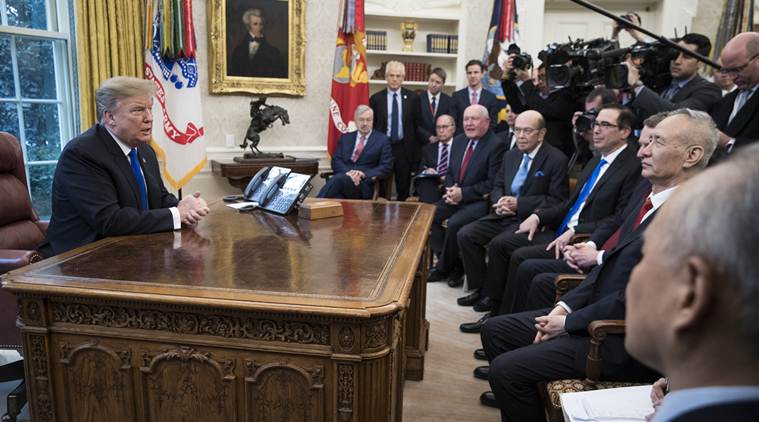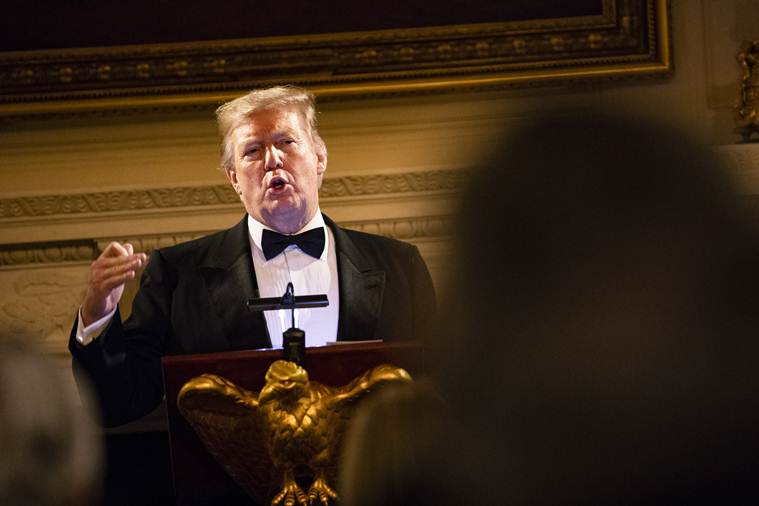- India
- International
Donald Trump touts progress with China, but pressure grows for a tough deal
Citing “substantial progress” in talks between the United States and China, Trump on Sunday evening halted plans to raise tariffs on $200 billion worth of Chinese goods at the end of this week.
 President Donald Trump meets with China’s Vice Premier Liu He, right, and members of US and Chinese delegations that were meeting for trade talks this week, in the Oval Office of the White House, in Washington. (Sarah Silbiger/The New York Times)
President Donald Trump meets with China’s Vice Premier Liu He, right, and members of US and Chinese delegations that were meeting for trade talks this week, in the Oval Office of the White House, in Washington. (Sarah Silbiger/The New York Times)
Written by Alan Rappeport
President Donald Trump’s decision to back off his threat to raise tariffs on Chinese goods carries substantial political risk as the president faces increased pressure from Republicans, Democrats and some of his own advisers to win the kind of tough concessions that Beijing has long resisted.
Citing “substantial progress” in talks between the United States and China, Trump on Sunday evening halted plans to raise tariffs on $200 billion worth of Chinese goods at the end of this week. On Monday, the president predicted that President Xi Jinping of China would soon join him at Mar-a-Lago, Trump’s Florida resort, for a “signing summit.”
“We’re getting very, very close,” Trump said at a gathering of governors at the White House.
Trump’s optimism has cheered Wall Street and business lobbyists, who have been pushing for a quick end to the trade war. But Democrats and even some Republicans are not so sanguine.

Top Democrats, in an effort to outflank Trump on China, are warning loudly that the Chinese may simply be dangling false promises in hopes of getting the president to end a trade war that is hurting American farmers and damaging the Chinese economy. Some Republicans fear that Trump may settle for a deal that simply reduces the trade deficit between the two countries and potentially offers relief to a Chinese telecommunication giant, Huawei, which is facing criminal charges in the United States.
“It’s become a real concern that Democrats could use this against him in the 2020 election,” Michael Pillsbury, director of Chinese strategy at the Hudson Institute and a White House adviser, said of the dangers of Trump cutting a modest trade deal with China.
Trump has positioned his monthslong trade fight with China as necessary to win “the biggest deal” in history. China has agreed to make some changes to its trading relationship with the United States, including purchasing more soybeans and natural gas and preventing currency manipulation. The government has also committed to opening up financial services, insurance and car markets, changes the Chinese have previously discussed.
 On Monday, Donald Trump predicted that President Xi Jinping of China would soon join him at Mar-a-Lago, Trump’s Florida resort, for a “signing summit.” (Samuel Corum/The New York Times)
On Monday, Donald Trump predicted that President Xi Jinping of China would soon join him at Mar-a-Lago, Trump’s Florida resort, for a “signing summit.” (Samuel Corum/The New York Times)
But many of the biggest sticking points still remain, including China’s state subsidization of companies, which gives Chinese firms a competitive advantage. Beijing also still appears to be falling short of the administration’s demands to stop what it says is a pattern of cybertheft and to end a requirement that U.S. companies hand over valuable intellectual property as a condition of doing business there, people familiar with the negotiations said.
The Chinese are touting a clause in their investment law that would crack down on such transfers of technologies and offering up tougher regulations surrounding patents and copyrights, but some administration officials are skeptical that these changes will go far enough.
The Chinese Embassy released a statement through China’s state news agency, Xinhua, on Monday saying talks over the weekend were focused “on the text of an agreement” and that the two sides would continue to push toward an agreement.
“The Chinese delegation said that substantial progress was made on such specific issues as technology transfer, protection of intellectual property rights, non-tariff barriers, service industry, agriculture and exchange rates,” the statement said.
Top Democrats have focused on Trump’s desire to reduce the bilateral trade deficit with China and are prepared to call any agreement that is based primarily on purchases of U.S. soybeans, liquid natural gas and other farm products a failure.
“At the heart of our economic challenges with China is its shirking of market economics, so it is troubling that Donald Trump may settle for a government commitment to buy U.S. agriculture as a means to let China off the hook,” said Sen. Ron Wyden, D-Ore.
Senior Republicans are also concerned that the president might soften on China. Sen. Chuck Grassley, R-Iowa, chairman of the Senate Finance Committee, tweeted Monday that Trump should not “take a half deal as a good deal” and urged the president to demand structural changes that are enforceable.
Democrats will have their first formal opportunity to confront the Trump administration directly on its China trade policy Wednesday when Robert Lighthizer, the U.S. trade representative, testifies before the House Ways and Means Committee. Lighthizer, a longtime China hard-liner and the administration’s top negotiator, is expected to face tough questioning from Democrats seeking assurances Trump will not accept a watered-down deal and declare victory.
“With so many losses, Trump needs a win and any win will suffice — even one that is just Chinese promises of future purchases without meaningful, structural reform,” said Rep. Lloyd Doggett, D-Texas, who sits on the Ways and Means Committee.
Trump has already started to signal his political concerns publicly. During a news conference this month at the White House, the president suggested that he would invite Democratic leaders to participate in negotiations with China so that they would not be able to undercut whatever agreement he reaches.
“Any deal I make with China, Schumer is going to stand up and say, ‘Oh, it should’ve been better,’” Trump said, referring to Sen. Chuck Schumer of New York, the Senate minority leader. “That’s called politics.”
An aide to Schumer said that no invitation has been offered.
Last week, Trump even embraced Sen. Bernie Sanders, I-Vt. on trade. The president said that Sanders, who is making his second presidential run as a Democrat, tends to agree with him on the issue and that Sanders is “tough on trade.”
While Sanders has praised some of Trump’s moves on trade, he has also been critical of his negotiating approach in some cases, and has opposed the Trump administration’s steel and aluminum tariffs on Canada, Mexico and Europe.
Pillsbury said that Trump’s campaign advisers have been gathering opposition research files on potential 2020 rivals and carefully taking note of what certain people, such as Sen. Sherrod Brown, D-Ohio, who is considering a run, have been saying about China.
Brown was one of three top Democrats — along with Schumer and Wyden — who sent a letter to Steven Mnuchin, the Treasury secretary, this month urging the administration to “stay aggressive” and ensure that China commits to verifiable, enforceable reforms. The letter was sent after reports that Mnuchin wanted to scale back Chinese tariffs in advance of a deal.
“I will wait to judge the outcome of the trade talks until I know what’s been agreed to,” Brown said in a statement. “But it’s imperative that the White House secures an enforceable deal that includes long-term structural reforms to stop China’s unfair trade practices and ensures American workers can compete on a level playing field.”
Officials from both countries have continued to be vague about the details of the progress, leading to speculation that China is just repackaging old promises as new concessions. China experts and business lobbyists say that the Chinese government has been carefully watching the shifting political dynamics in the United States, along with Trump’s continuing legal turmoil, as it determines how to navigate the trade war in an environment with Democrats controlling more power in Washington.
In some cases, newly empowered Democrats have become an asset to the administration’s China hawks, Lighthizer and Peter Navarro, who have been pressing Trump not to cut a modest deal and roll back tariffs to please Wall Street.
Schumer has long been critical of China’s trade practices that have been harmful to the rural parts of New York state and he has been a vocal critic of China’s history of currency manipulation. House Speaker Nancy Pelosi’s return as the leader of the House of Representatives was also met with wariness in China. She has for years been outspoken about China’s human rights record and has met on multiple occasions with the Dalai Lama, the exiled Tibetan spiritual leader vilified by China.
Because of that long history, Trump’s advisers fear that Democrats in Congress will have more credibility when criticizing Trump’s eventual China agreement even if it does not require congressional approval.
“The Democrats are going to use this against him,” said Craig Allen, president of the U.S.-China Business Council. “As we go into the election cycle, it is natural and part of our national tradition that one side criticizes the other for China.”
Allen noted that political protest in the United States over China goes back to the country’s inception, with the Boston Tea Party triggered by anger over imports of Chinese tea and that the anti-China sentiment tends to bubble up every four years. In 2012, Sen. Harry Reid of Nevada, then the Democratic majority leader, called for U.S. Olympic uniforms to be burned when it emerged that they were made in China.
There are also signs that Trump could face backlash from his own party if he is too conciliatory. During his meeting Friday with a Chinese delegation in the Oval Office, Trump raised eyebrows among Republicans when he suggested that relief for Huawei, which has been charged with stealing intellectual property and impeding an investigation into the telecom company’s attempt to evade economic sanctions on Iran, could be part of the trade deal.
After Trump’s comment, Sen. Tom Cotton, R-Ark., tweeted that Huawei is a “serious national security threat” and a “Trojan Horse” for the Chinese Communist Party. And Sen. Marco Rubio, R-Fla., dismissed a tweet by Sonny Perdue, the agriculture secretary, for touting China’s commitment to buy an extra 10 million metric tons of soybeans and said that any deal that allows China to keep “stealing trade secrets” will not be a success.
The blowback from both directions may leave Trump little choice but to keep the threat of tariffs alive so that he can continue to claim he’s being tough on China, analysts said. In a January interview with The New York Times, Trump acknowledged that some of the $250 billion worth of tariffs could be made permanent.
On Monday, as Trump headed to Hanoi, Vietnam, for a meeting with North Korean leader Kim Jong Un, he tweeted: “Relationship between our two Countries is very strong. I have therefore agreed to delay U.S. tariff hikes. Let’s see what happens?”
Apr 26: Latest News
- 01
- 02
- 03
- 04
- 05







































